Does playing Rock, Metal, or Blues have to be noisy, or can you play an electric guitar unplugged? In this article, I’ll reveal the pros and cons of unplugging your instrument and everything you can do to make it sound better!
You can use the table of contents below to take you to the area that interests you. Click on the little box to open it, and then click on the section of the article you want to read, or you can read from start to finish if you want the full unplugged experience!
The Short Answer
Yes, you can play an electric guitar without an amplifier, especially during practice sessions and performances for small audiences. Unplugged solidbody electrics make the least amount of noise, while unplugged hollow body electrics give the loudest and richest tone. Semi-hollow body electrics are the most versatile for playing unplugged and amplified. It’s essential to weigh the pros and cons of each guitar type if you will be playing unplugged.
Keep On Reading (Below) To Learn More
Pros And Cons Of Playing A Guitar Unplugged


A famous playwriter once said something like, “To amplify or not to amplify, that is the question.”
Here are the pro and cons of playing your electric guitar without plugging it into an amp. You can click on each entry in the table to get more information.
Keep On Reading (Below) To Learn More About Each Topic
The Type Of Electric Guitar You Have Matters!
If you’re someone who likes to practice or play unplugged between amplified sessions, it’s essential to consider the type of electric guitar that will serve you best!
Solidbody Electrics
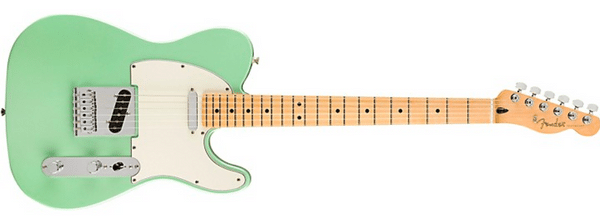
Solidbody electrics are the least adaptable for playing unplugged because they don’t have a resonant chamber or a sound hole, and they make a thin sound. They can be ok to play without an amplifier in a small quiet room while you are practicing, but if you are playing to an audience, nobody is going to hear you!
They also tend to be less costly than many semi-hollow and hollow body guitars.
If you have a roommate that adores silence, a solidbody electric can be ideal. Of course, if you really get desperate, you can always plug it into a headphone amp!
This is a good way to go for players looking for a compact “couch guitar” to play while watching movies or TV. You can sit there and zone out, playing scales and arpeggios on autopilot without disturbing anyone.
To find out my favorite picks for couch guitars, check out my article below.
Related Article ➡ The Best Couch Guitar – Relaxing, And Effortless To Play!
Semi-Hollow Body Electrics
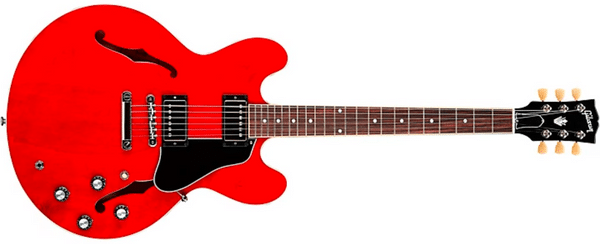
Semi-hollow body electrics sit in between solidbody and hollow body guitars in terms of their acoustic resonance. So if you want a guitar that’s louder than a solidbody but more compact than a hollow body, this is a great choice!
They can easily be heard unplugged in a small quiet room, and they’re compact enough to be comfortable to play in a relaxed sitting-down position.
Hollow Body Electrics
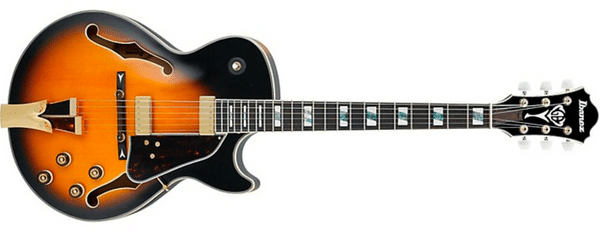
The hollow body electric is the granddaddy of the three in terms of size and acoustic resonance. It’s a favorite among Jazz players because it plays with the speed and tonal versatility of an electric but has a much warmer tone than semi-hollow and solidbody types.
You can easily entertain a small audience without an amplifier. Unfortunately, they never really caught on as a Rock guitar due to severe feedback issues. However, a few players like Ted Nugent, the “Motor City Madman,” have used their feedback problem as a musical advantage!
How About Portability?
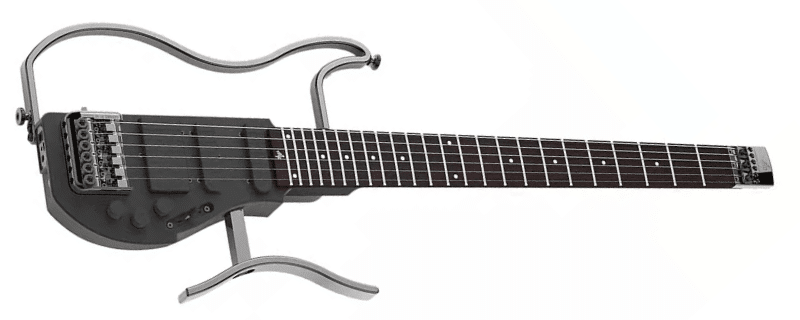
One of the biggest benefits of playing unplugged is the ability to take your guitar anywhere without worrying about taking an amplifier or having access to electricity!
Playing without an amplifier also eliminates the risk of an electrical hazard. Some tube amplifiers can store up to 600 Volts or more in their electrolytic capacitors. I’m certainly not making an argument for ditching your amp altogether, but if you plug in, be sure your equipment is well-grounded, there is no water hazard, etc.
I take an electric travel guitar with me whenever I travel. Sometimes I play through a guitar amplifier simulation on my smartphone, but I wouldn’t really miss plugging in for practice sessions on the run!
When I was a college student, I always took a solidbody electric guitar with me to practice in the student union between classes. It never seemed to disturb any other students, and I got in an extra five to ten hours of practice time a week!
Making Unplugged Electrics Sound Better

Here are some of the ways you can make an unplugged electric guitar sound better.
Use Thicker Gauge Strings
Thicker gauge strings give you more volume, even if the guitar is unplugged. This is because they need to be picked harder to provide a clear sound, which will vibrate the guitar’s body and neck more than thinner strings.
I recommend using at least 10-gauge (10 to 46) strings if you’re playing a solidbody unplugged. Most semi-hollow body electrics have this gauge, and hollow bodies can have 11 gauge (11 to 52) or higher.
Some jazz players use flat-round or half-round strings to make them quieter and give a richer tone.
Use A Heavier Pick
When playing an electric guitar unplugged, a medium or heavy pick can give you more sound, which will be especially noticeable with solidbody guitars.
Set The Action Higher
A higher action (string height) also allows the strings to vibrate better, giving a louder and clearer sound. It’s easier to hear string squeaks and buzzing without an amplifier, and a lower action can make string buzz worse! On the other hand, too high an action can accentuate string squeaking.
Make The Intonation Spot-On
A guitar can sound out of tune at certain fret positions if the intonation is not adjusted correctly. In addition, bad intonation can make it more difficult to hear the harmonics of certain notes.
Amplification can make it easier to bring out harmonics, even if the intonation is a bit off, and using a dirt (overdrive or distortion) pedal can hide a small tuning problem.
Choose The Right Room
If you’re playing unplugged, choose a smaller room with good acoustics. You’d be surprised what a difference this can make, especially if there’s more than one player or a singer!
Why Do You Need A Guitar Amplifier?
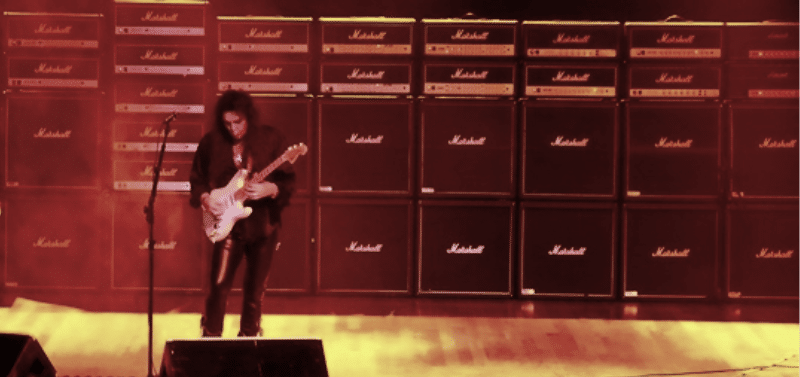
Here are some reasons to plug an electric guitar into your favorite amp.
To Be Heard
Let’s face it, making awesome sounds is really one of the main reasons guitar players go electric! It’s one thing to have an amplifier and play unplugged for practice sessions or convenience, but not having an amp for whatever reason can be truly unbearable and even torturous!
Some players go to amplification extremes to get their God-like sounds. For example, check out the picture above of Yngwie’s amp setup! To quote him, “There are two things you can see from space, the Great Wall Of China and Yngwie’s great wall of Marshalls!” Haha!
Most of us only need one good amplifier to take us to electric guitar heaven! However, be warned that collecting amps can be an addictive proposition!
Tonal Versatility
There’s really only one basic sound you can get from an unplugged electric guitar, even if you’re a dynamic player. Plugging in opens up a whole world of tonal options! You have the various pickup positions and tone controls on the guitar, all the amp settings, and whatever effects pedals are at your disposal!
More Dynamic Sound
Plugging in is not just about tone! The power of amplification can make your playing infinitely more dynamic with tremolo effects, volume swells, and accentuated harmonics! In addition, a good amplifier, especially a Class-A design, can bring out the most subtle nuances in your playing!
Effects Pedals
Effects pedals brought the electric guitar into a whole new dimension of sound! However, electronic effects need to be plugged into an amp to make their magic happen. Without effects, there would be no reverb, delay, phaser, flanger, or chorus.
Dirt pedals like overdrive, distortion, and fuzz, took Rock and Metal to new levels as far back as the 1960s!
Related Article ➡ What Is A Guitar Stomp Box – Attractive, Little, Tantalizing
Looking Cool
Let’s not forget how cool it looks to be playing through an amplifier! Some players like combo amps, and others crave stacks! Marshall made stacked speaker cabinets legendary!
If you’re a Rock or Metal player, you probably dream of a wall of Marshall amps! Players like Jimi Hendrix and Ritchie Blackmore looked amazing in front of their amps, and you could tell they really meant business, even before they started playing!
When I was in high school, I went to Black Sabbath concerts and worshiped Tony Iommi’s sound coming from his wall of Laney stacks! Life didn’t get better than that! Today we have players like Yngwie Malmsteen, Steve Vai, Joe Satriani, and so many more!
Is It Better To Practice Unplugged?
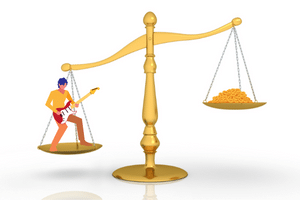
There are definitely two schools of thought on the best way to practice new songs, chords, scales, and various playing techniques.
I personally find it easier to focus on perfecting a song or playing skill and technique when my guitar is unplugged. Once you plug in, it’s easy to find yourself in “fun land,” which is great, but practice discipline can quickly go out the window, dealing with things like feedback and adjusting knobs to dial in just the right tone and sound!
So, I suggest you practice unplugged to get the playing mechanics down and then add amplification to get your tone and effects.
Also, it can be a good idea to break practice sessions into an unplugged and electrified component to have the best of both worlds.
When it comes time for recording or public performance, it’s essential to be comfortable playing the material with the guitar, amp, and effects you will use for the gig! Any slight change can through off subtleties in the sound or timing!
Does An Unplugged Electric Sound Like An Acoustic Guitar?
No, not really. Although an unplugged electric guitar will get its sound from the strings acoustically vibrating the body and neck of the instrument, it won’t sound like an all-acoustic instrument.
Unplugged hollow body and even some semi-hollow body electrics can approximate the sound of an acoustic instrument, but an unplugged solidbody electric won’t even come close!
If you want the sound of an acoustic guitar, then you should purchase an acoustic instrument!
All Electric Guitars Sound Different Unplugged!
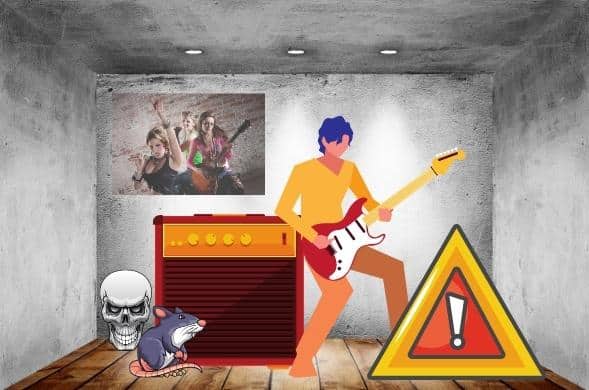
One type of unplugged electric guitar can sound very different from another!
An unplugged solidbody, semi-hollow body, and hollow body guitar will all sound remarkably different! Even two guitars in the same design category may not sound the same.
For example, a Stratocaster and a Les Paul are both solidbody guitars, but an unplugged Strat does not sound like an unplugged Les Paul. This is because the two body shapes, necks, and tone woods are different.
The Stratocaster is made from an ash or alder body and a maple neck, while the Les Paul is all mahogany. In addition, the Strat body is much thinner than the Les Paul. This makes the Strat brighter-sounding with less sustain than the Les Paul.
Frequently Asked Questions

Here are some of the questions I get asked about electric guitars.
If your question does not appear here, please put it in the comments, and I will get right back to you with an answer.
Can Neighbors Hear An Unplugged Guitar?
Although it’s unlikely that a neighbor can hear an unplugged solidbody guitar, someone in a different room or an adjacent wall of a separate apartment could hear an unplugged hollow body or semi-hollow body guitar that is being strummed aggressively.
Related Article ➡ Is Your Neighbor Upset With Your Loud Guitar Playing? – Read This!
Should I Unplug My Guitar After Playing?
You can leave your guitar out on a stand when you’re done playing it, but it’s a good idea to unplug it to avoid tripping on the cable and damaging the guitar. However, leaving the cable plugged in won’t cause any actual harm to the guitar.
Can You Practice Electric Guitar Silently?
All electric guitars will make some degree of noise as the strings vibrate the wood of the body and neck. However, unplugged electric guitars are pretty soft compared to acoustic instruments.
Why Do Electric Guitars Buzz Unplugged?
The buzzing you hear from an unplugged electric guitar comes from the strings hitting frets higher up the neck. To correct this, the string height may need to be raised, or the neck’s truss rod may require an adjustment.
It’s best to get a professional guitar setup if you don’t know the proper way to do it to prevent damage to your guitar.
Is It Easier To Play The Electric Guitar If You Play Acoustic?
Yes, it is usually easier for acoustic guitarists to play an electric guitar because electrics have thinner strings and a lower string height (action).
Do Electric Guitars Sound Better With An Amp?
Yes, electric guitars typically sound better when plugged into a good amplifier because the tone can be adjusted, and effects like overdrive can be added. The output volume of the instrument can also be adjusted for audience size.
Final Thoughts

I hope you enjoyed this article on “Can You Play An Electric Guitar Unplugged” and that it helped you understand that electric instruments don’t need to be amplified to provide you with the practice time and enjoyment that playing the guitar can bring!
Unplugged electrics can help you focus on practice routines rather than tone.
Understanding the pros and cons of playing an electric guitar unplugged will help you decide what type of electric instrument is best for you.
Solidbody electrics make the least amount of noise unplugged, but they are more suitable for practice than performance.
A semi-hollow body electric is probably the best choice for someone who wants a guitar that’s quiet enough to play unplugged without disturbing others but can also be used to perform without an amplifier in smaller settings.
Unplugged hollow body electrics can come close to the volume of acoustic guitars, so their richer and louder tone can be used unplugged in larger-audience performance situations.
You can improve the sound of your unplugged electric guitar by using thicker gauge strings, a heavier pick, higher action, the correct intonation, and a smaller room.
Still, an amplifier can increase your sound and tonal versatility while giving you access to effects pedals and a cool look!

Here’s a video from Fender featuring Molly Miller explaining the differences between an acoustic versus an electric guitar and how you can play an electric instrument unplugged or with a reduced volume.
Check it out!
Tell Me What You Think
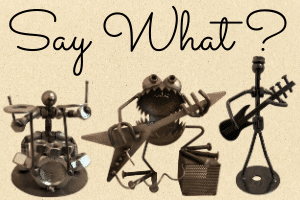
Please leave a comment below if you enjoyed this article, have any questions about guitars, or want to give your point of view. I will be happy to help you.
- Which type of electric guitar do your like best for playing unplugged? Why?
- When do you usually play your electric guitar unplugged?
- Do you think this article helped you decide which type of guitar is best for your needs?
- What else is on your mind?

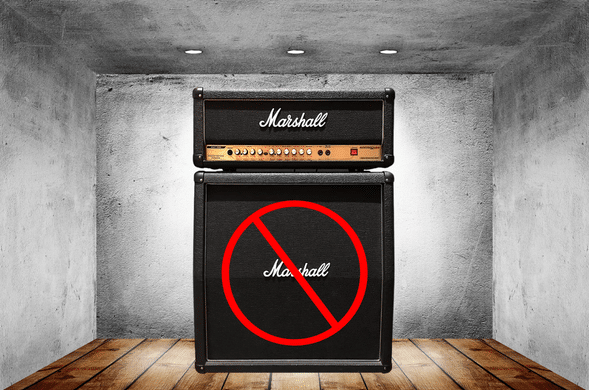

Alright, let’s talk about electric guitars! Now, I’m not exactly what you’d call a “guitar expert” – I can’t even play “Wonderwall” without fumbling around for the chords. But, after reading Frank’s article on “Can You Play an Electric Guitar Unplugged?”, I feel like I’ve learned something new about these fancy instruments.
Before, I always assumed that electric guitars were useless without an amp to plug them into. But it turns out, you can actually play them unplugged! Who knew? According to Frank, playing an electric guitar unplugged can actually be a great way to practice without disturbing your neighbors or family members.
Now, I don’t have any personal experience with electric guitars – in fact, I’ve never even touched one. But I’m always open to learning new things, and Frank’s article definitely taught me something new about the world of guitars. So, if you’re like me and you’re curious about electric guitars, definitely give Frank’s article a read. Who knows – maybe you’ll be inspired to pick up an electric guitar and give it a strum yourself! Thanks for the great info, Frank!
Hi, Bob
I appreciate your comments!
So, I recommend you give the electric guitar a try. It can be used to play any genre of music.
For example, if you play Rock, Blues, or Metal, you’ll probably want a solidbody electric. On the other hand, jazz players typically use semi-hollow body or hollow body electrics.
Check it out!
Frank 🎸
I appreciate your article very much Frank and am eager to try out some of the tips you outline therein.
Yrs ago I began learning the guitar on my own, practicing with an acoustic guitar that was very punishing and difficult on my fingers. I endeavored to try on an electric simply because I was told the pressure required was not the same and the electric might be more finger-friendly.
Do you think the electric could be easier for a beginner to learn considering the issue on the fret board is much more forgiving?
I am glad you included ask the technical aspects that got have such as tone, more dynamic sound and pedal effects but at this moment those considerations are loftier than my skill.
Hi, Joseph
Thank You for your comments!
Yes, an electric guitar is usually easier to play than an acoustic because the strings are thinner and closer to the frets.
You don’t have to spend a lot of money to get a decent electric guitar. I would suggest you look at the Fender Squier series.
Best of Luck!
Frank 🎸